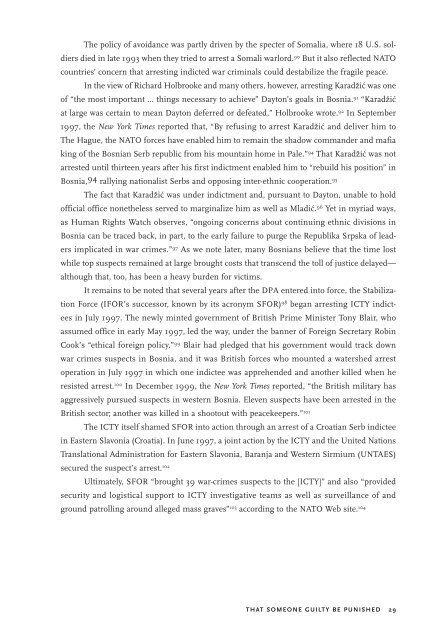That Someone Guilty Be Punished - Open Society Foundations
That Someone Guilty Be Punished - Open Society Foundations
That Someone Guilty Be Punished - Open Society Foundations
You also want an ePaper? Increase the reach of your titles
YUMPU automatically turns print PDFs into web optimized ePapers that Google loves.
The policy of avoidance was partly driven by the specter of Somalia, where 18 U.S. soldiers<br />
died in late 1993 when they tried to arrest a Somali warlord. 90 But it also reflected NATO<br />
countries’ concern that arresting indicted war criminals could destabilize the fragile peace.<br />
In the view of Richard Holbrooke and many others, however, arresting Karadžić was one<br />
of “the most important … things necessary to achieve” Dayton’s goals in Bosnia. 91 “Karadžić<br />
at large was certain to mean Dayton deferred or defeated,” Holbrooke wrote. 92 In September<br />
1997, the New York Times reported that, “By refusing to arrest Karadžić and deliver him to<br />
The Hague, the NATO forces have enabled him to remain the shadow commander and mafia<br />
king of the Bosnian Serb republic from his mountain home in Pale.” 94 <strong>That</strong> Karadžić was not<br />
arrested until thirteen years after his first indictment enabled him to “rebuild his position” in<br />
Bosnia, 94 rallying nationalist Serbs and opposing inter-ethnic cooperation. 95<br />
The fact that Karadžić was under indictment and, pursuant to Dayton, unable to hold<br />
official office nonetheless served to marginalize him as well as Mladić. 96 Yet in myriad ways,<br />
as Human Rights Watch observes, “ongoing concerns about continuing ethnic divisions in<br />
Bosnia can be traced back, in part, to the early failure to purge the Republika Srpska of leaders<br />
implicated in war crimes.” 97 As we note later, many Bosnians believe that the time lost<br />
while top suspects remained at large brought costs that transcend the toll of justice delayed—<br />
although that, too, has been a heavy burden for victims.<br />
It remains to be noted that several years after the DPA entered into force, the Stabilization<br />
Force (IFOR’s successor, known by its acronym SFOR) 98 began arresting ICTY indictees<br />
in July 1997. The newly minted government of British Prime Minister Tony Blair, who<br />
assumed office in early May 1997, led the way, under the banner of Foreign Secretary Robin<br />
Cook’s “ethical foreign policy.” 99 Blair had pledged that his government would track down<br />
war crimes suspects in Bosnia, and it was British forces who mounted a watershed arrest<br />
operation in July 1997 in which one indictee was apprehended and another killed when he<br />
resisted arrest. 100 In December 1999, the New York Times reported, “the British military has<br />
aggressively pursued suspects in western Bosnia. Eleven suspects have been arrested in the<br />
British sector; another was killed in a shootout with peacekeepers.” 101<br />
The ICTY itself shamed SFOR into action through an arrest of a Croatian Serb indictee<br />
in Eastern Slavonia (Croatia). In June 1997, a joint action by the ICTY and the United Nations<br />
Translational Administration for Eastern Slavonia, Baranja and Western Sirmium (UNTAES)<br />
secured the suspect’s arrest. 102<br />
Ultimately, SFOR “brought 39 war-crimes suspects to the [ICTY]” and also “provided<br />
security and logistical support to ICTY investigative teams as well as surveillance of and<br />
ground patrolling around alleged mass graves” 103 according to the NATO Web site. 104<br />
THAT SOMEONE GUILTY BE PUNISHED 29

















